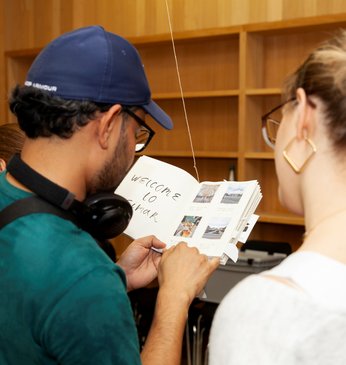The educational aim of the course could be called interdisciplinary: students should learn, that travel and transport are first and foremost social phenomena, although they are usually framed to be issues of engineering and planning exclusively. Given that, students should be able to critically reflect the impact of their travel behaviour, as well as the implications of modes of travel concerning questions of cultural contexts of hierarchy (for example inequal possibilites of accessing modes of transport, etc.)
Multiple Mobilities. Intercultural and Decolonial Perspectives on Travel
Multiple Mobilities. Intercultural and Decolonial Perspectives on Travel
As participants of the Bauhaus Spring School we all need to cover a distance: at first by using our laptop or tablet in order to join an online seminar, thus meeting digitally. Later, we all take a car, train or plane in order to reach Thuringia and meet physically. In both cases, media technologies enable us to join as an international group from all over Europe. The course aims to reflect critically the importance of these technologies as tools within intercultural contexts.
Thus, travel is an integral part of the Bauhaus Spring School, if not international academia in total. Therefore, the course will combine theoretical positions with everyone´s personal travel experience: First, we will take a look at the broad range of publications from the field of Media Studies dealing with phenomena of mobility, transport and travelling (the so-called Mobility Studies). These include essays and papers dealing with very recent topics, such as the global stoppage of travel during the CoVid pandemic, the impact of transport on the ongoing climate crisis or de- and postcolonial questions on mass tourism. The selection will provide an international overview, combining positions from Europe, North America as well as the Global South.
Secondly, students will be asked to write a travel diary during their journey to Weimar and their stay here in Thuringia. These can be texts, photos, short videos or other forms of presentation. The aim is to reflect upon how arguments provided by the theoretical texts are actually part of our travel routines. The diaries will be presented on the final day of the Bauhaus Spring School.
NOTE:
This course includes an attendance phase in Weimar from March 14 to March 23, 2024.
Urbanism, Architecture, Social Science, Art History, Environmental Engineering, Civil Engineering, …
Master´s student are especially welcome, though a completed Bachelor´s degree is not mandatory.
Maximilian Rünker, M.A.
- Since 04/2020: Research and Teaching assistant at Research Training Group Media Anthropology, BUW
- Since 12/2019: Research and Teaching assistant at Chair of Transport System Planning, BUW
- 05/2019 – 03/2020: Doctoral Scholarship of the Free State of Thuringia
- 10/2012 – 03/2016: M.A. Mediaculturalanalysis, Heinrich-Heine-Universität Düsseldorf
- 10/2009 – 09/2012: B.A. Media and Cultural Studies, Heinrich-Heine-Universität Düsseldorf
International Experience:
- 10/2011 – 03/2012: International Guest Student at University of Reading, United Kingdom
Skills and Focus:
- Interdisciplinary work covering both humanities as well as engineering and planning (Media Studies combined with Mobility Studies)



As participants of the Bauhaus Spring School we all need to cover a distance: at first by using our laptop or tablet in order to join an online seminar, thus meeting digitally. Later, we all take a car, train or plane in order to reach Thuringia and meet physically. In both cases, media, technologies enable us to join as an international group from all over Europe. The course aims to reflect critically the importance of these technologies as tools within intercultural contexts.